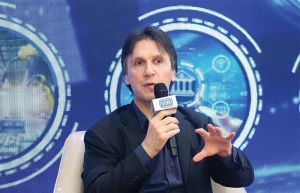Building more sustainable mobile networks with 5G
Mobile technology is the most democratic and inclusive technology ever, with more than 8.5 billion subscribers on the same standard, giving our industry a truly global scale. Robust digital infrastructure is a prerequisite for a digital society, but with data traffic increasing rapidly – and expected to almost quadruple by 2028 – it is essential to build even more network infrastructure.
 |
| Denis Brunetti - President in Vietnam, Myanmar, Cambodia, and Laos, Ericsson |
Mobile data traffic per smartphone continues to grow strongly in Southeast Asia and Oceania and is expected to reach around 54GB per month in 2028 – a compound annual growth rate of 24 per cent according to June’s Ericsson Mobility Report. Hence, rapid build-out of 5G is critical to manage costs and deliver the best customer experience.
5G leverages new spectrum assets to deliver capacity with a much lower cost-per-gigabyte, while reducing the power consumed per delivered gigabyte. Upgrading legacy 4G sites to 5G could achieve increases of up to 10 times in capacity and also reduce energy consumption by more than 30 per cent.
5G can enable 10x more carbon emission reductions through the transformation of industry than the ICT sector itself emits. Digital technologies including 5G will be fundamental to halving carbon emissions every decade until 2050 and meeting the 1.5-degree Celsius global target.
Mobile broadband networks and digitalisation will not only help transform industries but reduce climate impacts. Our industry is responsible for 1.4 per cent of global emissions, but has the potential to reduce 15 per cent of global emissions in sectors like transport and manufacturing.
Due to our installed radio base being 5G ready, the introduction of the next mobile generation gives Ericsson the opportunity to reduce the climate footprint of mobile networks. These energy efficiencies are being achieved by preparing the network with latest technology solutions, activating energy-saving software, deploying 5G optimally, and operating site infrastructure intelligently. This is beneficial for communication service providers as well as countries focused on sustainable socioeconomic development.
Ericsson is making its 5G Ericsson Radio System portfolio 10 times more efficient for the same amount of transferred data compared to 4G based on factors like improvements in radio unit design, multi-band technology, and hardware components such as Ericsson Silicon. This is a dedicated, purpose-built system on a chip design solution that makes it possible to create high performing, smaller, and lighter radios that consume less energy.
Building a high-performing and energy-efficient 5G network is part of our vision for resilient and sustainable future networks. Using our energy-optimised 5G portfolio, we are tackling one of our industry’s greatest challenges – reducing network energy consumption and carbon footprint while scaling up 5G. Our goal is to realise a low-carbon future while accelerating 5G experience.
Ericsson invests $4.4 billion in research and development annually, corresponding to almost 18 per cent of its sales. Around a quarter of its workforce is also deployed in such activities.
The new performance demands on networks require new levels of spectral efficiency and flexibility. The higher spectral efficiency of 5G and the lower energy footprint of the new 5G Ericsson Radio portfolio translates into a lower cost/GB for service providers as traffic grows. Multiple-input, multiple-output technology offers communication service providers the larger bandwidth of the mid-band to deliver powerful 5G experiences nationwide.
Ericsson believes that mobile networks need to be planned, built, and operated with precision. By taking a holistic view of network evolution, expansion, and operation, we have advanced our approach to break the upward trajectory of energy consumption in mobile networks. As traffic varies daily, the use of energy-saving applications is fundamental to adjusting the capacity of mobile networks to match demand and to delivering the best user experience with the lowest energy use.
This can be achieved through a portfolio of tools and capabilities including the latest AI and machine learning, as well as automation solutions which can help to reduce perceived complexity barriers. With zero-touch problem-solving and predictive energy management, Ericsson is well-equipped to support communication service providers in keeping energy use and carbon emissions at a minimum.
Ericsson has launched almost 150 live 5G networks across 63 markets across the globe. It relies on its strong product portfolio with best in class spectral efficiency, fast deployments of networks, and strong partnership with communications service providers to optimise the network and deliver superior network performance.
We are working towards building resilient, secure, and sustainable networks in Vietnam that have the best performance and optimal total cost of ownership, whilst also providing a superior digital customer experience.
 | Ericsson’s commitment to supporting the digital transformation of Vietnam Ericsson has been contributing its technology leadership to digital transformation in Vietnam over the past 30 years. Denis Brunetti, president of Ericsson in Vietnam, Myanmar, Cambodia, and Laos, talked to VIR’s Bich Thuy about his own journey and the plans ahead for the company in Vietnam. |
 | 5G commercialisation – a must to drive the digital vision of Vietnam Vietnam wants to commercialise 5G, thus enabling the country to achieve its digital vision. Denis Brunetti, president of Ericsson in Vietnam, Myanmar, Cambodia and Laos, talked to VIR’s Minh Anh about the key factors in this journey and how the company can support these efforts. |
 | 5G to accelerate digitalisation in Vietnam Digitalisation is already a driving force in every industry across our planet and is the closest thing we have to a silver bullet for solving major global challenges, such as the climate crisis and social inclusion. Mobile networks have been a key enabler of digitalisation, which puts our industry at the centre of a powerful trend where anything that can go wireless, will go wireless. |
What the stars mean:
★ Poor ★ ★ Promising ★★★ Good ★★★★ Very good ★★★★★ Exceptional
Themes: Digital Transformation
- PM sets five key tasks to accelerate sci-tech development
- Ho Chi Minh City launches plan for innovation and digital transformation
- Dassault Systèmes and Nvidia to build platform powering virtual twins
- Sci-tech sector sees January revenue growth of 23 per cent
- Advanced semiconductor testing and packaging plant to become operational in 2027
Related Contents
Latest News
More News
- Ho Chi Minh City launches plan for innovation and digital transformation (February 25, 2026 | 09:00)
- Vietnam sets ambitious dairy growth targets (February 24, 2026 | 18:00)
- Masan Consumer names new deputy CEO to drive foods and beverages growth (February 23, 2026 | 20:52)
- Myriad risks ahead, but ones Vietnam can confront (February 20, 2026 | 15:02)
- Vietnam making the leap into AI and semiconductors (February 20, 2026 | 09:37)
- Funding must be activated for semiconductor success (February 20, 2026 | 09:20)
- Resilience as new benchmark for smarter infrastructure (February 19, 2026 | 20:35)
- A golden time to shine within ASEAN (February 19, 2026 | 20:22)
- Vietnam’s pivotal year for advancing sustainability (February 19, 2026 | 08:44)
- Strengthening the core role of industry and trade (February 19, 2026 | 08:35)

 Tag:
Tag:




















 Mobile Version
Mobile Version